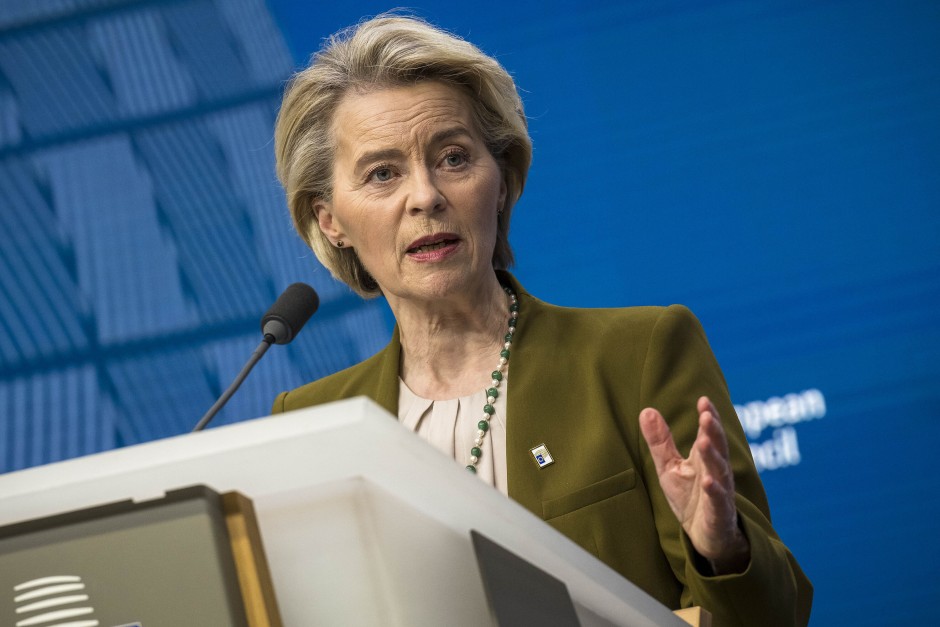
Europe is ready to take its fate into its own hands. Because we cannot afford to become a mere game ball in history. ” Ursula von der Leyen, the President of the European Commission, struck a high but no new tone when she presented her proposal for a European upgrade program. But the only ones are not.
In Corona pandemic and after the Russian invasion of Ukraine, the EU has learned how problematic its previous dependence on China and Russia. “A large part of European industry is based on very cheap energy from Russia, on a very cheap workforce from China and highly subsidized semiconductors from Taiwan,” said former EU Commission Vice President Margrethe Vestager. Since the beginning of the second term of the American President Donald Trump, the realization has been aware that the outsourcing of security to the United States is no longer an option. Trump also sees himself as a partner of the EU in other areas, but as a competitor. This is evidenced by the already announced and the threatening tariffs.
Europe is forced to rethink autonomy and sovereignty. Is the EU ready for this? In the Brussels Jargon, the de-dralatin of America is now on the program after the DE-Risking of China, even if the Leyen never put this term in its mouth and, unlike China, the United States would far from classify as a “systemic rival”. The main focus is that the Commission is systematically looking for contact with other partners beyond the United States and China. The quick conclusion of the trade agreement with the South American Mercosur countries after Trump's election in November was an important step in this way that extends beyond the pure trade relationships. It is about influence, geopolitically and geoeconomic.
The EU is looking for new partners
The journey together almost the entire commission to India at the end of February was the next step. She also culminated in a clear commitment to a quick conclusion of the trade talks until the end of the year. The EU's summit followed in mid -March with South Africa. From the Leyen, new financial aid of 4.7 billion euros announced as part of the “Global Gateway” program, which is intended as a European answer to the Chinese silk road initiative.
At the end of next week, Leyen will travel to Uzbekistan with Council President António Costa for the first summit from EU and Central Asia, immediately after Trump's “Liberation Day”, on which he wants to announce the next wave of customs. The message is clear: the EU is looking for new partners with the aim of greater sovereignty. “We live in an increasingly confusing and fragmented world in which the only practical solution for the EU is to build stronger partnerships to promote peace and prosperity,” says Costa.
But the greatest of action is the pressure of action in defense. The Europeans face a specific threat from Russia and can no longer rely on American support. Until Trump's second taking office, there was also the view in most EU member states that the Europeans should prevent the Russian threat as part of NATO and should not build up parallel structures. This assumption no longer has any inventory. The fact that the European Union is not responsible for defense in principle increasingly takes a back seat.
“Ready to defend” by 2030?
NOTEST COMMUNTION ARE that the EU, with 449 million inhabitants, does not have to be dictated by the United States with 342 million inhabitants, does not help. Especially since the Americans in economic strength leave the Europeans far behind and also set the tone in defense spending.
The EU wants to make the EU “ready to defend” by 2030. The target date is based on secret service knowledge that Russia would be militarily willing to start a new war by 2030. The Europeans should work together in the best possible way and upgrame them drastically in the future. In principle, the EU heads of state and government have already approved the proposals.
Unrealistic ideas such as a European army, the head of the commission rejects a cancellation. Member States always held responsibility for their troops, she says. As a core task of the EU, she sees the filling of “ability gaps” at short notice. On the one hand, this means to replenish emptied arsenals with air bodies, ammunition, artillery and air defense. On the other hand, however, the EU is intended to develop military systems that have been missing so far and that it depends on the United States. It is particularly about drones and their defense, about “offensive cyber abilities” or the use of military artificial intelligence and quantum informatics.
“We need military autonomy”
The EU will not have such “strategic enables” by 2030 and will remain dependent on the United States, says Sven Biscop. He is a political scientist at the Belgian Egmont Institute for International Relations. The EU will not be able to replace American secret service skills during this period, warns Biscop. This will be so far at the earliest in 2035.
But that doesn't change the fact that the Leyen is on the right track. “We need military autonomy. This means the ability to carry out military operations without the help of the United States,” says Biscop. France's nuclear, which is unclear, is an example of such possibilities that can be unit rafale jets that are free from American components.
The head of the commission is that the scope, costs and complexity of relevant military projects went far beyond the capacities of individual Member States. The EU could win new autonomy from community projects. In addition, the joint development of state -financed major projects, but also the joint procurement. The hope is in larger demand and such a cheaper purchase. The Commission's proposals also contain special autonomy requirements that amount to the fact that you have to buy in Europe (“Buy European”). Weapons should only be ordered from companies that are based in European EU or NATO countries. In addition, at least 65 percent of the cost of a product must be eliminated on components from the EU.
Exceptions for upgrading
Above all, joint projects want to finance the Leyen from a new community fund of 150 billion euros called “Safe”. It is said to take out loans on the market from the EU budget and pass them through to the Member States. Behind it is the idea that many countries can finance the projects in interest rate than if they go borrowing themselves. 20 of the 27 EU countries could benefit from this, according to the Commission. Of course, the interest rate differences of most countries to the EU are very low, so that only a few countries with a considerable risk surcharge such as Hungary and the Czech Republic should benefit significantly.
The 150 billion euros from the safe fund are the only ones that the EU Commission could have in terms of defense. From the Leyen, however, 800 billion euros have called for upgrade by 2030. The rest of 650 billion euros are based on the hope that the Member States themselves put a lot more money into the armor and accept the commission offer to be excluded from the EU budget controls for these expenses. It is open whether this hope is bearing. Union and SPD have loosened the debt brake in Berlin for defense. Especially in the EU countries, which are already highly indebted, reluctance to the financial package from Leyens outweighs.
Some EU member states are similarly difficult to forge new alliances with the Commission's attempt. The EU cannot avoid deepening the trade relationships with the rest of the world if it wants to secure its supply of important raw materials and differentiate its economic relationships. More trade in countries such as Canada, Mexico, Japan, South Korea and Vietnam-all countries with which the EU already has trade agreements-would compensate for the consequences of a trade war with the USA together with a slight reduction in non-tariffs, the authors of a study by the Institute for World Economy in Kiel for the Heinrich Böll Foundation.
However, the knowledge of the advantages of international trade does not yet pave the way for new trade agreements. It is open whether the Mercosur Agreement will find the majority among the EU member states. Fear is great in countries such as France, the Netherlands or Austria of farmer's protests against the competition from South America. It is currently unclear to what extent the EU will actually be able to regain economic sovereignty through closer trade relationships with other countries and to break away from China and the USA.
In direct contradiction to the expansion of trade relationships, the European Commission is looking for more sovereignty to obtain more protectionism. She took this path from the Leyens in the first term. Relevant initiatives were formulated as a European answer to supposed or actual American industrial policy and with the aim of strengthening the competitiveness of the local economy.
Behind it is the idea that the European economy must be at least in key sectors regardless of America and China; This requires state funding and protection. Examples are the specifications that are anchored in the EU Raw Material Act and in the “Net-Zero Industry Act” for the promotion of green technology. This continues in new initiatives such as the “Clean Industrial Act”. The announcement also includes the announcement of loosening the merger control with the intention of creating European champions. To the outside, the commission protects the industry from the supposed Chinese overproduction through tariffs. Where all of this is not enough, the Leyen wants to open the subsurface as part of the next multi-year EU financial framework with a generously equipped competitive fund.
The sovereignty understood in this way is not far away from classic French -inspired industrial policy. With the obvious solution for more sovereignty, the promotion of competitiveness through deregulation, however, the Leyen still struggles. Her first suggestions for reducing bureaucracy continued than all other initiatives in recent years. However, the initiatives are not yet considered a big leap to the liberation of the economy of unnecessary requirements. Philipp Eckhardt from the Center for European Politics speaks for many economists if he only calls the suggestions “a small step”.







